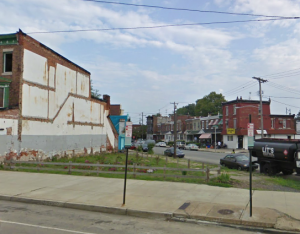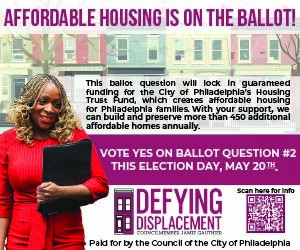In recent months, the 5000 block of Baltimore Avenue has become a politically-charged center of controversy that has West Philly residents both frustrated and perplexed. Should the block, flanked by some boarded-up buildings, evolve with the help of local businesses into a commercial strip? Or should the city step in, reclaim the land and enlarge an existing health center and include parking?
A public meeting scheduled for next Thursday (see details below) will provide an opportunity for business owners and residents to discuss these two possibilities.
As Naked Philly reported earlier this month, community members learned in November about possible tentative plans to redevelop mostly privately-owned properties between 50th and 51st Streets. The redevelopment, which would happen through eminent domain, could make way for an expansion of the Mercy Wellness Center at 5008 Baltimore Avenue as per a proposal currently being considered by the Philadelphia Redevelopment Authority (PRA).
For many residents, the tentative expansion proposal, submitted to the PRA by the Baltimore Avenue Redevelopment Corporation (BARC) — the non-profit that owns the Wellness Center—runs contrary to the needs of the community. In business owner Saba Tedla’s view, what the neighborhood needs along the slowly developing stretch are more restaurants and retail spaces that can solidify the Baltimore Avenue Corridor as a destination point—and without the use of eminent domain. (According to a recent City Paper article, the BARC proposal is “in flux” and may have already lost steam as inferred by statements made by BARC’s current president, Dr. Benjamin Smallwood.)
After all, more foot traffic on that block can only help Tedla, who owns Seeds Gallery at 5011 Baltimore Avenue and the restaurant Aksum further east on Baltimore and plans to open a second restaurant across from the center this spring. She wants the competition.
“People like myself feel that the needs of the community are more for commercial retail than it is to have an expansion of a parking lot and a healthcare center,” Telda told West Philly Local. “If I know I’m opening a restaurant, why am I asking for restaurants? Because I am a member of the community. It’s productive and economical for more people to have more jobs [and] to attract more young professionals.”
(In the interests of full disclosure, we should point out that Aksum is a West Philly Local sponsor).
“There’s great opportunities and commercial space right here,” she said.
One of those great opportunities would have been a much-lauded neighborhood garden center planned for two lots on the southeast corner of 51st Street and Baltimore Avenue. But, due to the threat of eminent domain, those plans may be abandoned, according to Ryan Spak, owner of the two lots. If the PRA follows through with the proposal, his property would be swept up in the process.
Spak also doesn’t feel that the eminent domain process nor an expansion of the Wellness Center is a best use of the block — at least, not as it relates to his property. Spak said that he purchased the lots “for the purpose of redevelopment. [The Spak Group] bought them for us as a community to find the highest and best use for them. The highest and best use for them right now … is a garden center.”
According to Spak, the somewhat reticent situation began to unfold after the Philadelphia City Planning Commission released its final University Southwest District Plan for Philadelphia 2035, the city’s two-phase effort to improve Philadelphia. While community members combed through its hefty 98-pages, they read something curious: as part of the three main actions to revitalize the Baltimore Avenue Commercial Corridor, properties at the intersection of 51st Street and Baltimore Avenue would be recertified as blight to “aid redevelopment.” This redevelopment, claims the plan, would include active ground floors and possible housing for seniors — a need, it’s noted, that “has been identified.”
The plans for blight recertification came as a shock to community members involved in the public meetings and process for Philadelphia 2035. “At no point in time during those community meetings did anybody mention the 5000 and 5100 blocks of Baltimore Avenue being recertified as blight,” Spak told West Philly Local. “Yet somehow that issue came up within the plan itself.”
So community members began asking questions and, as conversations with the Planning Commission and Philadelphia Redevelopment Authority —which also handles building condemnation — began to progress, “it became very apparent that there was more than just a recertification taking place,” he said.
“I don’t think anybody knew what was going to be revealed [at the meeting] until it was already happening,” Ryan Spak told West Philly Local. “Nobody knew about eminent domain process until it was explained that there was a proposal and the start of the process had begun.”
Right now, said both Spak and Tedla, the details of the possible development, the impact of eminent domain and how other investors can submit competing bids are vague. Next Thursday (Jan 30), Cedar Park Neighbors and the Baltimore Avenue Business Association will hold a public meeting on the plans that will hopefully shed some light on the process. (Editor’s Note: The meeting will take place at 6:30 p.m. at People’s Baptist Church (5039 Baltimore Ave). Facebook invitation page is here.)
In the end, though, what the battle over the 5000 and 5100 blocks of Baltimore Avenue boils down to is the competing visions of revitalization between the city and the local community — and whether eminent domain is really the way to proceed. “There’s disconnect in what the need of the community is versus what [the city] is trying to do,” Tedla told West Philly Local, “or maybe there’s disconnect on what the community may have needed a long time ago.”
“The folks that live in this neighborhood, the real estate investors who have purchased these properties on that block who have desires to redevelop that block are starting to do it all on their own. Because we as a community are doing this, there is no need for eminent domain,” Spak said.
“We as a community can rebuild this block and we can rebuild the next block if given the opportunity.”
–Annamarya Scaccia









Recent Comments